- Home
- Aaron Allston
Star Wars: X-Wing VI: Iron Fist Page 6
Star Wars: X-Wing VI: Iron Fist Read online
Page 6
His expression cleared. “All right. As I said, Admiral Ackbar has evaluated these theories and made a decision. He’s asking Intelligence to step up any operations involving Kuat Drive Yards to find out if, in fact, they are building a new Super Star Destroyer. But that’s low priority and not our concern. For us, he wants to combine both Runt’s and Piggy’s ideas. We’ll be founding our own pirate band, Wraiths, and then assaulting a planetary system that Zsinj is courting—or should be, if he isn’t. Officially, we’ll be assigned to the Mon Remonda with Rogue Squadron; funny, though, the other pilots will never see us in the ship’s corridors.
“We have a little reorganization to do to accommodate our new pilots. Flight Officer Donn, you’re now Wraith Two, and my wingman.”
The pilot with the unruly blond hair smiled. He couldn’t have known that the position of Wraith Two, by Wedge’s policy, usually went to a raw pilot, one in need of additional instruction or protection.
“Wes, you’re now Wraith Three, with Dia Passik, Wraith Four, your wing.” Janson waved at the Twi’lek female, who gave him a grave nod.
“Kell, Runt, you’re still Five and Six. Runt, incidentally, is in training to be our new communications specialist. Phanan, Face, still Seven and Eight. I’d hate to break up the best comedy team this side of the janitor’s closet.”
“I love an understanding commander,” Phanan said. “Know where I can get one?”
“Myn Donos, still Nine. Flight Officer Nelprin—can you still hear me back there?—you’re his wing, Wraith Ten. Piggy, you’re still Wraith Twelve, and Tyria, you’re now on his wing as Wraith Eleven. I lead Group One, Face leads Group Two, and Donos leads Group Three. Questions?”
Wedge waited for the inevitable reaction from Kell. Previously, Kell had led Group Two and had been very twitchy whenever Face received recognition that might affect his own—Kell’s—position, and now Face had replaced him as group leader.
But Kell looked easy with the new arrangement, which surprised Wedge considerably.
It meant—Wedge wasn’t sure. Either Kell was content to let Face have a go at command, or Kell’s goals had changed and command was not so high on the list.
Wedge would wait. The truth would come out eventually. “Intelligence gives us a good candidate for our new piratical occupation. The world is called Halmad. It’s an Outer Rim world not far from the loose border to what we consider Zsinj-controlled space. It’s also a trade center at the hub of several well-traveled trade routes. A century or so back, their mining industry—ground, lunar, and asteroid belt—failed, leaving a number of facilities abandoned there. New Republic Intelligence has a team already in-system to check them out for us; if they haven’t found us a base by the time we arrive, they will at least have found us a place from which to stage.”
Kell asked, “Do we get the Night Caller back? Since we’ll be pirating in TIE fighters, I assume we’ll have to have something to haul us around when we hit sites out of our home system.”
Wedge shook his head. “Not the Night Caller. Think about it. Admiral Trigit is destroyed by a covert fighter squadron supported by a Corellian corvette, and then a pirate squadron pops up supported by a Corellian corvette? That would probably set off at least one alarm bell in Zsinj’s mind.” He gave Kell a grim smile. “No, we’ll receive hyperspace transport from an old Xiytiar-class transport. Unarmed. Slow. Creaky. Leaky. And instead of having a cargo bay full of your sophisticated metal brackets to hold our fighter craft, we’ll be using a few crossbeams and netting—so we can quickly switch out X-wings for TIE fighters without having to reconfigure our brackets every time.”
Kell sat back, his expression suggesting he’d just swallowed a mouthful of hydraulic fluid.
Phanan’s hand shot up. “Do we get new snubfighters?”
Wedge shook his head. “No. No new X-wings for the foreseeable future. We got lucky when we were putting the squadron together; when Rogue Squadron captured Ysanne Isard’s facilities on Thyferra, we also seized a number of X-wings she’d been accumulating for various Intelligence missions. That’s where four of our snubfighters came from. But the New Republic hasn’t had another windfall like that, and Incom is producing new X-wings as slowly and meticulously as ever. So we’re stuck with what we have … and what we can seize. Dia Passik was transferred with her snubfighter, but we’re still four short to make up a full squadron. However, the two TIE fighters we have remaining from the Implacable attack, the ones Wes and Piggy were flying, are assigned to us. And part of our assignment involves acquiring new fighter craft for our pirate identities … and that means stealing whatever we can get our hands on. From the Imps and from the warlords, that is. Do any of you new pilots have TIE-fighter experience? Simulated or real?”
Both the women raised their hands. Castin Donn looked unhappy that he couldn’t follow suit.
“Excellent. Castin, Kell, Phanan, since you three lack X-wings and TIE experience, I recommend you spend time in the TIE-fighter simulators and checking out our small complement of TIE fighters. Once we’re at our new station, that is. For now, you have only a little while to pack and settle your affairs; the transport Borleias takes off for Halmad in three hours.” He ignored the chorus of groans and cheers. “Dismissed. Phanan, Face, can I see you for a minute?”
As the others trickled out, he asked, “What is the news from what’s-her-name, Notsil?”
The two pilots exchanged glances. “Well,” said Face, “Lara seemed reassured by what you offered. We helped her put together her application for fighter-pilot training, and both of us and Kell wrote recommendations for her. Face set up an account for her so she could afford some limited HoloNet access to us; we’ll leave a router so she can reach us through Sivantlie Base. Things are in motion.”
“This had better work … or had better produce absolutely no results,” Wedge said. “Because if there are any foul-ups, General Cracken will personally feed you, and me, into a food reprocessor.”
4
He made no pretense at being fully human. He had probably been born human, but now mechanical limbs—obvious prosthetics, shiny stainless metal arms and legs with crude-looking joints—replaced his original flesh, and his entire upper face was a shiny metal surface with a standard computer interface inset in the center of his forehead.
He made no pretense at being friendly, either. He approached the booth where the big, good-looking businessman drank alone, and with neither threat nor comment he swung the wine bottle he held in his hands and brought it down on the businessman’s head.
The bottle shattered, spraying glass and red liquid all over the businessman. The man blinked, stood—demonstrating both a resilience and a physique others in the bar found admirable—and struck the cyborg, a blow that rocked the mostly mechanical man’s head and staggered him back into the booth filled with carousing Imperial pilots.
The pilots seated at the aisle shoved the cyborg forward, straight into the businessman’s professional-looking right cross. The blow caught the cyborg across the jaw, spinning him around. The cyborg staggered back to fall across the laps of two of the pilots in the booth. His flailing arm caught their glasses and bottles, throwing wine and liquor across everyone.
The pilots shoved him off to the floor and rose.
“Don’t do that,” the bartender said. But his voice was a plea and he wasn’t aiming a weapon. No one paid attention.
Suddenly hard-faced, a formidable group of six, the pilots glowered at the businessman and the cyborg. Their leader, the shortest of them, a dark-haired man with a face craggy enough for tiny snubfighters to fly their famous Trench Run Defense across, said, “You two owe us for a round and two bottles of local press, and we’ll take your booth and a hundred extra credits for our trouble.”
The businessman gave him a frosty smile. “With a hundred credits I could buy a pilot of your qualifications to lick my boots clean.”
“I’m calling the military police,” the bartender said.
The pilot
s surged toward the businessman. The first of them caught a knuckle punch in the solar plexus and dropped like a sackful of tubers. The second one was tripped up as the cyborg grabbed his knee and squeezed; the pilot’s shriek was shrill enough to resonate on empty glasses throughout the bar. The other four slammed into the businessman and bore him to the floor.
The bartender punched his emergency code into the comlink and began wailing to the distant listener.
Two minutes later, it was all but over. Two tables had been smashed, their entertained patrons now occupying booths on the other side of the bar. Five pilots and one cyborg lay at intervals across the floor, stretched out in various poses of very uncomfortable rest, often lying among broken glasses and platters of unhygienic appetizers. The businessman and the pilot leader were still standing, the latter glassy-eyed, barely responding to outside stimuli, while the former still occasionally swung ineffectual blows against his stomach. Both were drenched with sweat and booze, staggering with every slight move they made.
Then a half-dozen stormtroopers in the uniforms of military police poured into the bar. Some patrons—those who still had bets going on which of the fighters would win—groaned, but the bartender breathed a sigh of relief.
With calm efficiency, the stormtroopers manacled the eight malefactors’ hands behind their backs; the two men still standing put up no fight. Three of the downed pilots could not be brought back to consciousness, but one of the stormtroopers picked up two of them, slinging them with considerable ease over his shoulders, and a second picked up the last stubbornly unconscious pilot. The stormtroopers began to move out.
“Wait,” the bartender said. “Where do I sign?”
Two of the stormtroopers exchanged a glance. “Why would you want to sign?” asked one, the ranking officer.
“So I can put in a claim for damages!”
The cyborg sighed. “Oh, just tally up the bill. I’ll pay for the damages.”
The bartender rocked back, mollified. “Well, all right, then. Come back soon. We appreciate your patronage.”
As they swept out through the door, onto a rainy street of Halmad’s capital city of Hullis, the ranking officer among the pilots, the one who’d taken so much abuse at the businessman’s hands, gave the cyborg a dizzy but appreciative look. “Hey, you’re not all bad.”
“I just like a good scrap now and then.” The cyborg shrugged. Unfortunately for him, the motion put extra pressure on his shackles. They opened and dropped to the muddy ground behind him.
The pilot leader stared. “Hey, what the—”
“Fire,” said the stormtrooper leader.
Three of the stormtroopers obliged him. Stun beams hit the pilots’ torsos. The pilots dropped into the mud.
The stormtrooper leader looked around. There was no one to see, not much skimmer traffic this rainy evening, no one entering or coming out of the bar. He pulled off his helmet, revealing the features of Wedge Antilles, and took an unencumbered view around. No sign of witnesses. “Let’s hustle, people.”
The other troopers grabbed the three fallen pilots. They dragged and carried their prisoners around the corner of the building, then around behind, where their skimmer awaited in the darkness of a fallow field. It was no military skimmer, just a medium cargo carrier with a deep bed.
While the others dumped the pilots into the rear and draped blankets and netting across them, Wedge stripped off his stormtrooper armor and threw it in after them. “Good work, Tainer, Phanan. Either of you hurt?”
Kell shook his head and flexed, popping his unsealed manacles loose. “This suit’s probably a loss.”
Phanan waggled his head. “Kell didn’t do me any harm, but the bottle one of them hit my head with wasn’t fake glass like mine was. It didn’t even break. I hear ringing.”
“Sounds like a mild concussion. See our doctor about it.”
“Oh, I’m too important a doctor to see anyone as lowly as myself.”
Wedge waved at one of the ersatz stormtroopers. “Face, grab these pilots’ wallets, money pouches, whatever they’re carrying. I want every credit they have, hard currency only. How much damage did you two jokers do?”
Kell and Phanan looked at one another.
“Maybe a hundred,” Kell said. “Counting everything.”
“All right,” Wedge said. “If these pilots’ personal fortunes don’t add up to a hundred and fifty, we’ll make up the difference ourselves. Face, run the credits in to the bartender. Tell him the cyborg paid off, instant compensation for the damage, so sorry, he’s a miserable old drunk whose only entertainment is causing trouble at bars.”
“Hey,” said Phanan. “I resent the use of the word miserable.”
“Then get back here fast. We take off in three minutes.”
Wedge and Janson, still in stormtrooper armor but with their helmets off, lay atop a hill overlooking the nearby Imperial base. The optics Wedge held before his face made greenish daylight of the night. “Same as last night and the night before. I make four TIE fighters at the ready scramble-pad, under the watchful eye of half a stormtrooper squadron.”
“Not that we care,” Janson said.
“Not that we want those starfighters,” Wedge corrected him. “But we may have to deal with them on the way out. Anything coming up the road?”
Janson cast a negligent eye the other way. Down at the base of the hill to his left, the other Wraiths, their prisoners, and their cargo skimmer waited. Down to the right was the main road into the base. “A distant set of lights,” he said. “Oncoming. Probably just another staff skimmer carrying an officer home after a night on the town.”
“Castin Donn laid enough money down at enough cantinas, we’re bound to get what we want.”
“You may be right. That thing’s not maneuvering like a staff skimmer. It’s big and sluggish.”
Wedge twisted to look at the oncoming vehicle through his optics. “Imperial Military Police. Signal Runt.”
Janson waved a handheld light down at the other Wraiths, flicking its beam three times across them. This close to an Imperial base, Wedge preferred they not use comlinks, whose transmissions, even if coded or extremely short, might be noticed. At the base of the hill, Runt would now be using a portable scanner on the distant vehicle.…
From the Wraiths’ position came an answering blink of light, a single pulse.
“Runt signals yes. It’s loaded with personnel,” Janson said.
“Move out.”
Wedge and Janson scrambled down the side of the hill, not directly toward the other Wraiths, but angling toward the right, an intercept course. By the time they reached the base of the hill—with Janson’s armor now somewhat battered by a fall he’d taken during his descent—the other Wraiths were almost to the road.
Wedge and Janson caught up to them and put their helmets back on.
“Snap it up,” Wedge said, “march formation. Left foot, right foot.”
And the Wraiths managed something like a proper formation in spite of the loads they carried.
Runt carried one of the unconscious pilots over his shoulder, moving without difficulty. The Gamorrean Piggy could also have carried one of the pilots with fair ease, but could never have worn one of the sets of stormtrooper armor; he remained with the skimmer. Kell, now suited up as a stormtrooper, and Dia dragged an unconscious pilot between them; they held the pilot’s arms over their shoulders so the man remained upright. Phanan, also in a set of stormtrooper armor, and Face also dragged one of the pilots, as did Castin and Shalla, with Donos and Tyria dragging the fifth. The sixth pilot, the ranking officer among them, remained with Piggy.
It was several hundred meters to the gate into the base, but if Wedge calculated correctly, they wouldn’t have to walk the entire distance.
They heard the humming of the heavy skimmer behind them and Wedge turned to look. It was a large model, nearly identical to the one that had been part of the trap on Coruscant: It had an enclosure over the bed, and only the pilot and
the guard assigned to his protection were exposed to the elements. On the side was painted the stooping bird-of-prey insignia of Victory Base; over that design were the crossed batons of the base’s military police.
The skimmer pulled alongside Wedge’s troop of ersatz stormtroopers and prisoners. Its pilot called, “What happened to you?”
“Skimmer broke down,” Wedge said. “Repulsorlift failure in the energy transference array.”
“Care for a lift?”
“I’d put you up for a Hero of the Empire medal.”
The pilot tapped a button and a door in the rear enclosure opened; its hinge was at the bottom, allowing it to open down into a ramp. Wedge peered inside. The spacious enclosure held four stormtroopers and another pair of prisoners in the uniforms of Imperial maintenance personnel. Both prisoners were awake, though apparently anesthetized by alcohol.
Wedge’s people hauled their unconscious prisoners up the ramp and settled them down on the padded benches against the enclosure walls. Wedge, at the rear of the line, stayed tense. The stormtrooper armor the Wraiths wore—seized from prisoners during some of the countless clashes the Alliance had had with the Empire and brought as part of the squadron’s gear—was authentic enough, but the military-police insignia the Wraiths had meticulously painted on the armor might not pass close inspection. Also, the officer in charge of these real military police should, if he kept strictly to procedure, demand to see Wedge’s papers, and the forgeries Castin had put together … well, Wedge just didn’t know the new pilot well enough to rely unquestioningly on the man’s work as he’d come to do with Grinder, the squadron’s former computer expert.
But the Wraiths all shuffled into the enclosed bed of the skimmer, Wedge followed, the door closed behind him, and the vehicle lurched into motion, all without an unwelcome demand for papers. Wedge smiled. If security was lax here, it might be just as lax within the base.
“Hey, that’s Lieutenant Cothron,” one of the real stormtroopers said.

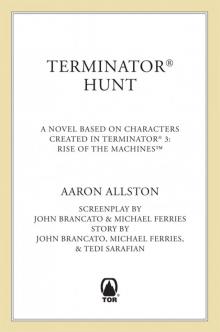 Terminator 3--Terminator Hunt
Terminator 3--Terminator Hunt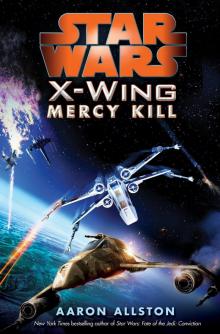 Mercy Kil
Mercy Kil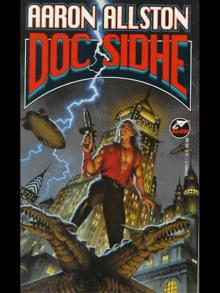 Doc Sidhe
Doc Sidhe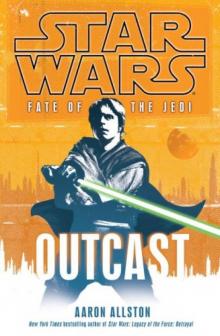 Star Wars: Fate of the Jedi: Outcast
Star Wars: Fate of the Jedi: Outcast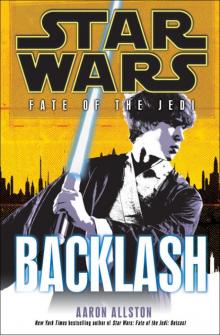 Fate of the Jedi: Backlash
Fate of the Jedi: Backlash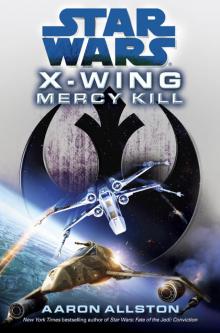 Mercy Kill
Mercy Kill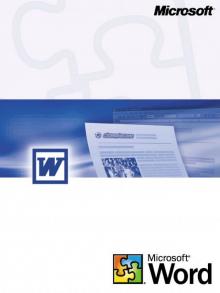 Rebel Stand
Rebel Stand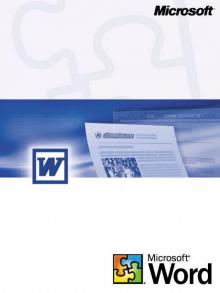 Wraith Squadron
Wraith Squadron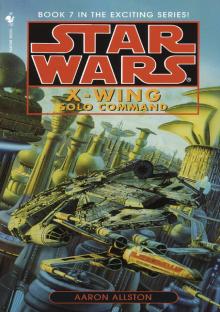 Star Wars: X-Wing VII: Solo Command
Star Wars: X-Wing VII: Solo Command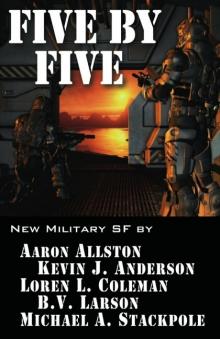 Five by Five
Five by Five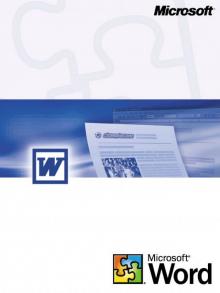 Solo Command
Solo Command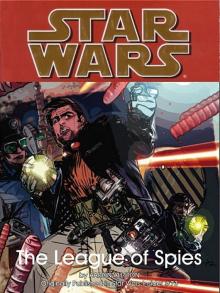 Star Wars: The Clone Wars Short Stories: The League of Spies
Star Wars: The Clone Wars Short Stories: The League of Spies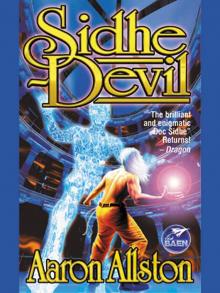 Sidhe-Devil
Sidhe-Devil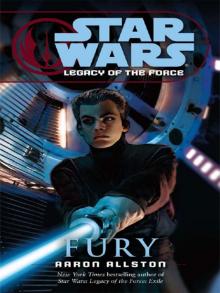 Star Wars: Legacy of the Force: Fury
Star Wars: Legacy of the Force: Fury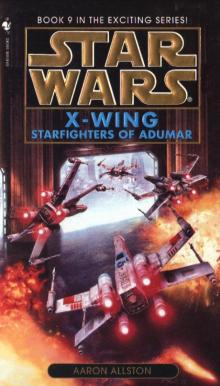 Starfighters of Adumar
Starfighters of Adumar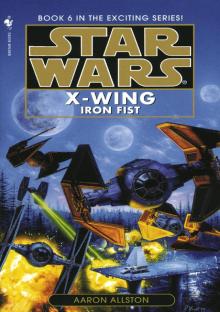 Star Wars: X-Wing VI: Iron Fist
Star Wars: X-Wing VI: Iron Fist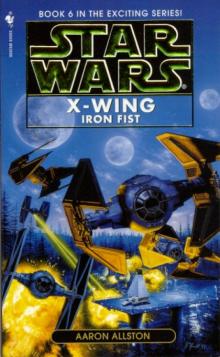 Star Wars - X-Wing - Iron Fist
Star Wars - X-Wing - Iron Fist Exile
Exile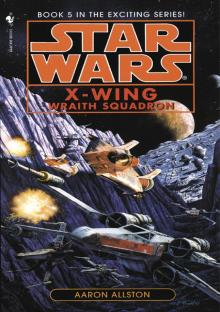 Star Wars: X-Wing V: Wraith Squadron
Star Wars: X-Wing V: Wraith Squadron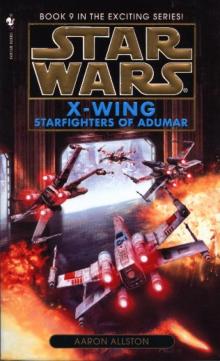 Star Wars - X-Wing - Starfighters of Adumar
Star Wars - X-Wing - Starfighters of Adumar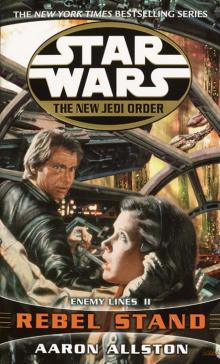 Rebel Stand: Enemy Lines II
Rebel Stand: Enemy Lines II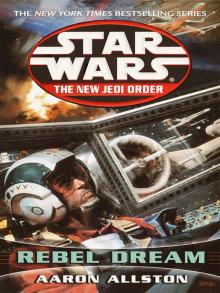 Rebel Dream: Enemy Lines I
Rebel Dream: Enemy Lines I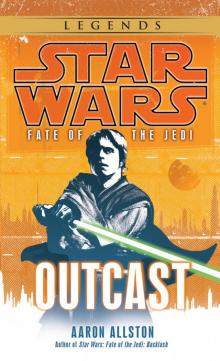 Outcast
Outcast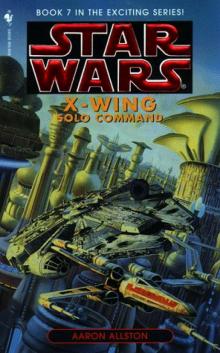 Star Wars - X-Wing 07 - Solo Command
Star Wars - X-Wing 07 - Solo Command